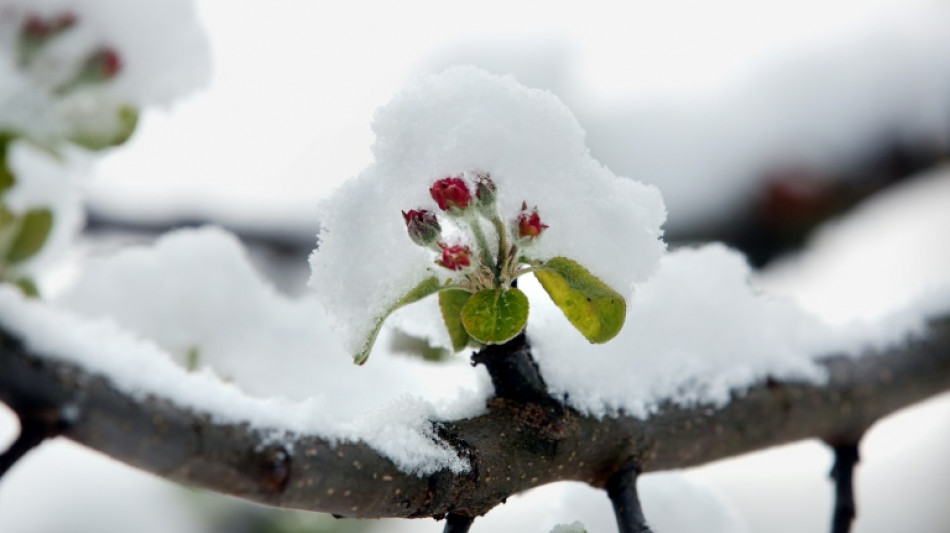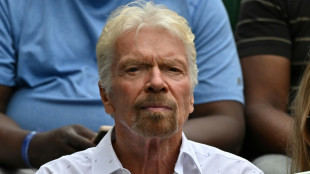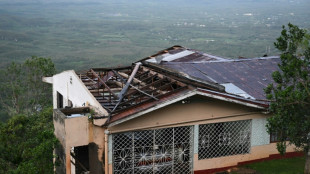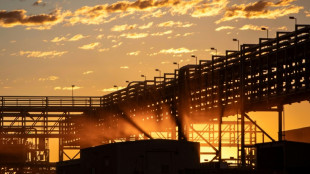
-
 'Significant' Xi, Trump talks win cautious optimism in China
'Significant' Xi, Trump talks win cautious optimism in China
-
French justice minister visits jailed former president Sarkozy

-
 Eurozone growth beats expectations in third quarter
Eurozone growth beats expectations in third quarter
-
Bali trial begins for 3 accused of Australian's murder

-
 Dutch election a photo finish between far-right, centrists
Dutch election a photo finish between far-right, centrists
-
IOC removes Saudi Arabia as host of inaugural Esports Olympics

-
 Russia batters Ukraine energy sites, killing two
Russia batters Ukraine energy sites, killing two
-
Shell's net profit jumps despite lower oil prices

-
 Pakistani security source says Afghanistan talks 'likely' to resume
Pakistani security source says Afghanistan talks 'likely' to resume
-
Fentanyl, beans and Ukraine: takeaways from Trump-Xi's 'great meeting'

-
 Asia markets fluctuate as investors examine Trump-Xi talks
Asia markets fluctuate as investors examine Trump-Xi talks
-
Branson's Virgin moves closer to launching Eurostar rival

-
 Russia hits Ukraine energy sites, killing one, wounding children
Russia hits Ukraine energy sites, killing one, wounding children
-
Asia markets fluctuate as investors mull Trump-Xi talks

-
 Trump, Xi ease fight on tariffs, rare earths
Trump, Xi ease fight on tariffs, rare earths
-
Volkswagen posts 1-billion-euro loss on tariffs, Porsche woes

-
 'Fight fire with fire': California mulls skewing electoral map
'Fight fire with fire': California mulls skewing electoral map
-
Fentanyl, beans and Ukraine: Trump hails 'success' in talks with Xi

-
 'Nowhere to sleep': Melissa upends life for Jamaicans
'Nowhere to sleep': Melissa upends life for Jamaicans
-
Irish octogenarian enjoys new lease on life making harps

-
 Tanzania blackout after election chaos, deaths feared
Tanzania blackout after election chaos, deaths feared
-
G7 meets on countering China's critical mineral dominance

-
 Trump hails tariff, rare earth deal with Xi
Trump hails tariff, rare earth deal with Xi
-
Court rules against K-pop group NewJeans in label dispute

-
 India's Iyer says 'getting better by the day' after lacerated spleen
India's Iyer says 'getting better by the day' after lacerated spleen
-
Yesavage fairytale carries Blue Jays to World Series brink

-
 Bank of Japan keeps interest rates unchanged
Bank of Japan keeps interest rates unchanged
-
Impoverished Filipinos forge a life among the tombstones

-
 Jokic posts fourth straight triple-double as Nuggets rout Pelicans
Jokic posts fourth straight triple-double as Nuggets rout Pelicans
-
UN calls for end to Sudan siege after mass hospital killings

-
 Teenage Australian cricketer dies after being hit by ball
Teenage Australian cricketer dies after being hit by ball
-
As Russia advances on Kupiansk, Ukrainians fear second occupation

-
 Trade truce in balance as Trump meets 'tough negotiator' Xi
Trade truce in balance as Trump meets 'tough negotiator' Xi
-
China to send youngest astronaut, mice on space mission this week

-
 Yesavage gem carries Blue Jays to brink of World Series as Dodgers downed
Yesavage gem carries Blue Jays to brink of World Series as Dodgers downed
-
With inflation under control, ECB to hold rates steady again

-
 Asia stocks muted with all eyes on Trump-Xi meeting
Asia stocks muted with all eyes on Trump-Xi meeting
-
Personal tipping points: Four people share their climate journeys

-
 Moto3 rider Dettwiler 'no longer critical' after crash: family
Moto3 rider Dettwiler 'no longer critical' after crash: family
-
US economy in the dark as government shutdown cuts off crucial data

-
 Trump orders nuclear testing resumption ahead of Xi talks
Trump orders nuclear testing resumption ahead of Xi talks
-
'Utter madness': NZ farmers agree dairy sale to French group

-
 Samsung posts 32% profit rise on-year in third quarter
Samsung posts 32% profit rise on-year in third quarter
-
30 years after cliffhanger vote, Quebec separatists voice hope for independence

-
 Taxes, labor laws, pensions: what Milei wants to do next
Taxes, labor laws, pensions: what Milei wants to do next
-
South Sudan's blind football team dreams of Paralympic glory

-
 US says 4 killed in new strike on alleged Pacific drug boat
US says 4 killed in new strike on alleged Pacific drug boat
-
What we do and don't know about Rio's deadly police raid

-
 'They slit my son's throat' says mother of teen killed in Rio police raid
'They slit my son's throat' says mother of teen killed in Rio police raid
-
Arteta hails 'special' Dowman after 15-year-old makes historic Arsenal start


Spring in February: UK plants flowering 'a month early'
Global warming is causing plants in the UK to burst into flower around a month earlier, with potentially profound consequences for crops and wildlife, according to research Wednesday that used nature observations going back to the 1700s.
Trees, herbs and other flowering plants have shifted seasonal rhythms as temperatures have increased, according to the study led by the University of Cambridge.
The results are "truly alarming" because of the ecological threats posed by early flowering, said Ulf Buntgen, a professor from Cambridge's Department of Geography, who led the research published in the journal Proceedings of the Royal Society B.
Crops can be killed off if they blossom early and are then lashed by a late frost, but reasearchers said the bigger threat was to wildlife.
This is because insects and birds have evolved to synchronise their own development stages with the plants they rely on. When they are no longer in phase, the result is an "ecological mismatch".
"A certain plant flowers, it attracts a particular type of insect, which attracts a particular type of bird, and so on," Buntgen said in a press release from the university.
"But if one component responds faster than the others, there's a risk that they'll be out of synch, which can lead species to collapse if they can't adapt quickly enough."
- Spring backwards? -
To track the changes in flowering patterns, researchers used a database known as Nature's Calendar, which has entries by scientists, naturalists, amateur and professional gardeners, as well as organisations such as the Royal Meteorological Society, going back more than 200 years.
Looking at more than 400,000 observations of 406 trees, shrubs, herbs and climbing plants across swathes of Britain, they found that the average first flowering date from 1987 to 2019 is 30 days earlier than the average first flowering date from 1753 to 1986.
The changes seen in recent decades coincide with accelerating impacts of human-caused climate change, especially higher temperatures.
Spring in Britain might eventually creep into the historically wintry month of February if global temperatures continue to increase at their current rate, said Buntgen.
That rapid shift in natural cycles could reverberate through forests, farms and gardens.
Buntgen said scientists need to have access to data that track whole ecosystems over long periods of time, if we are to truly understand the implications of climate change.
"We can use a wide range of environmental datasets to see how climate change is affecting different species, but most records we have only consider one or a handful of species in a relatively small area," said Buntgen.
There is growing concern among scientists about the scale of the impact of a rapidly warming world, on everything from extreme weather events to loss of biodiversity.
The United Nations last month confirmed that the past seven years have been the hottest on record, while the average global temperature in 2021 was around 1.11 degrees Celsius above the pre-industrial levels measured between 1850 and 1900.
D.Qudsi--SF-PST

